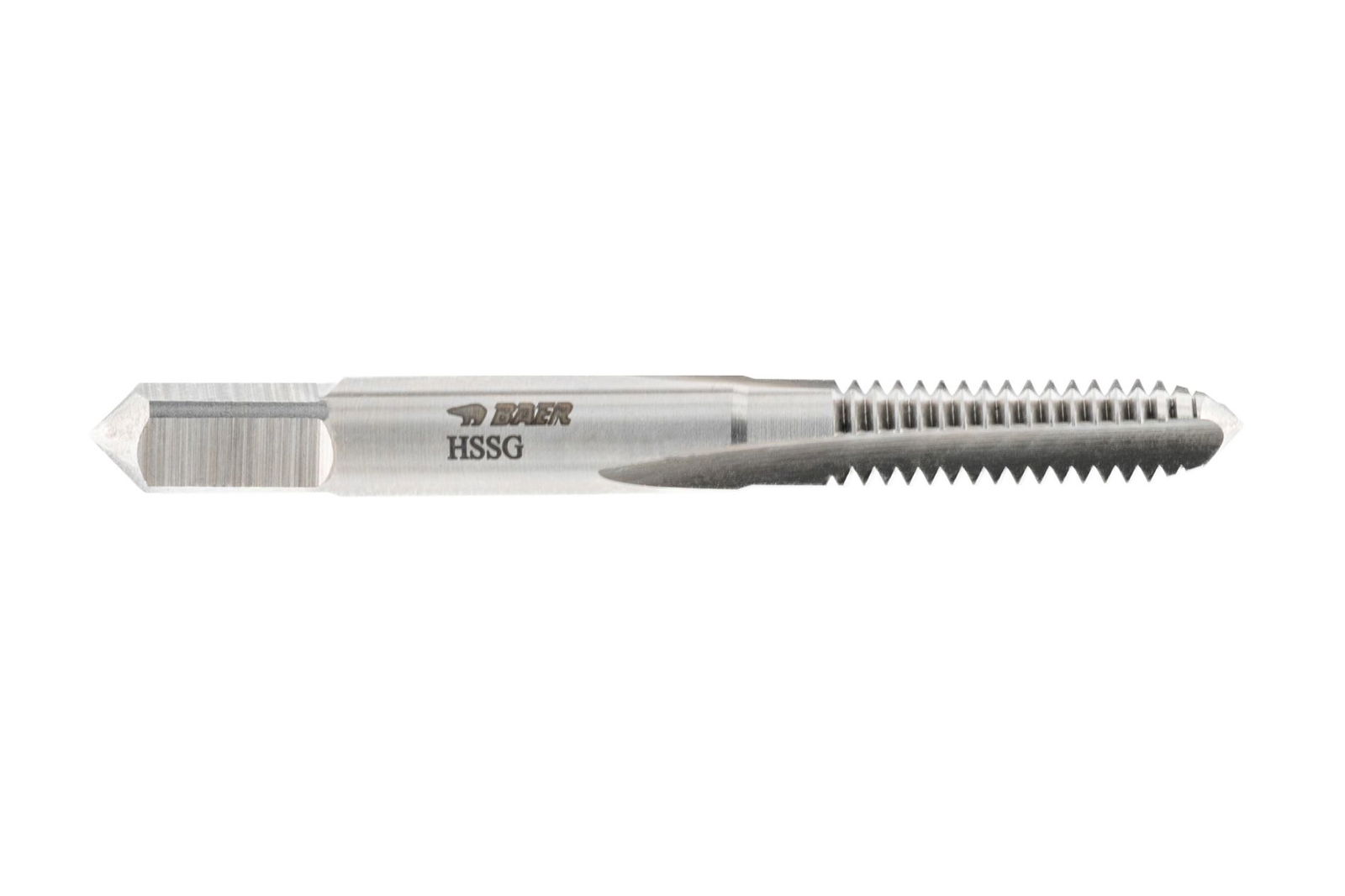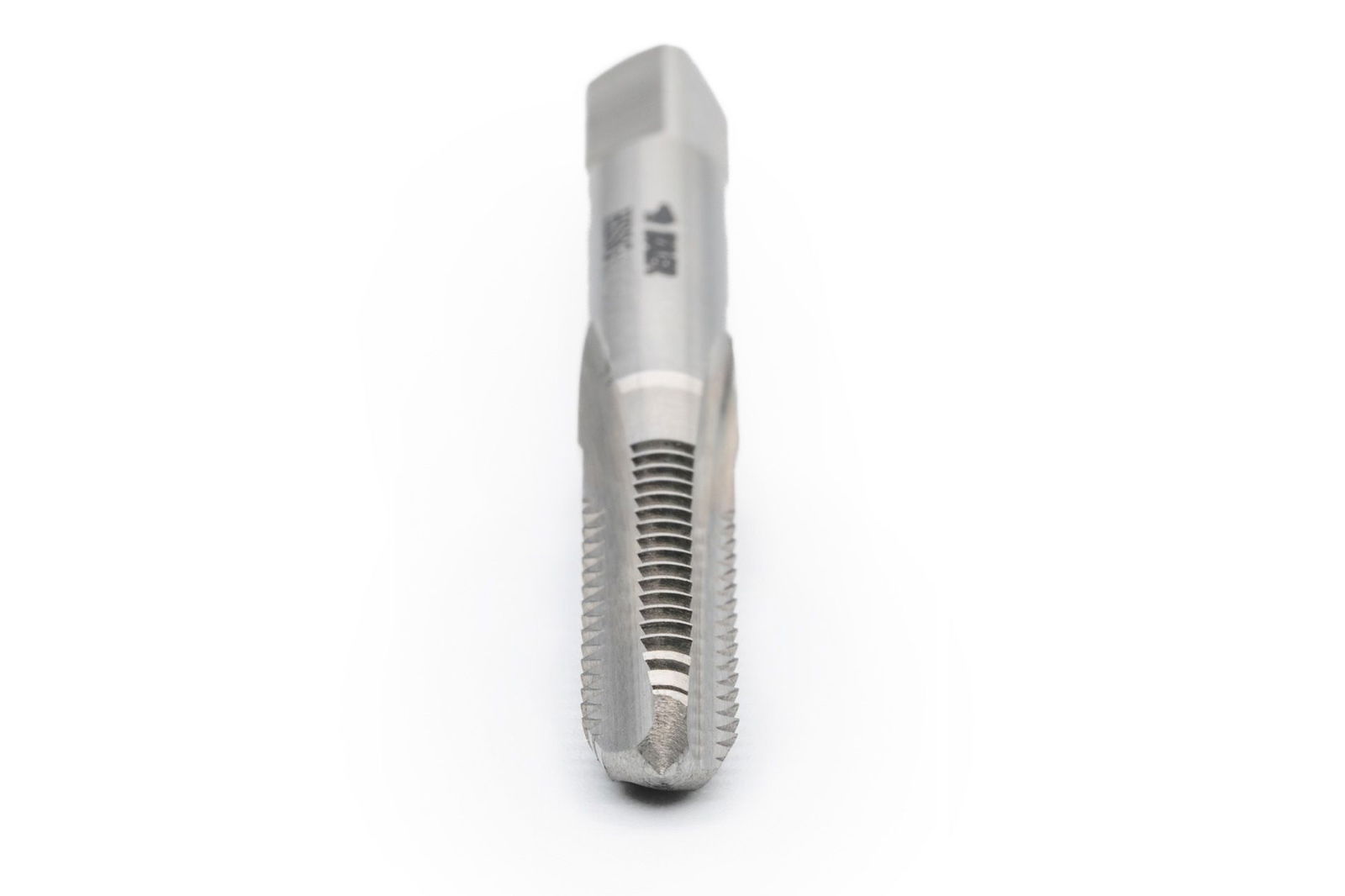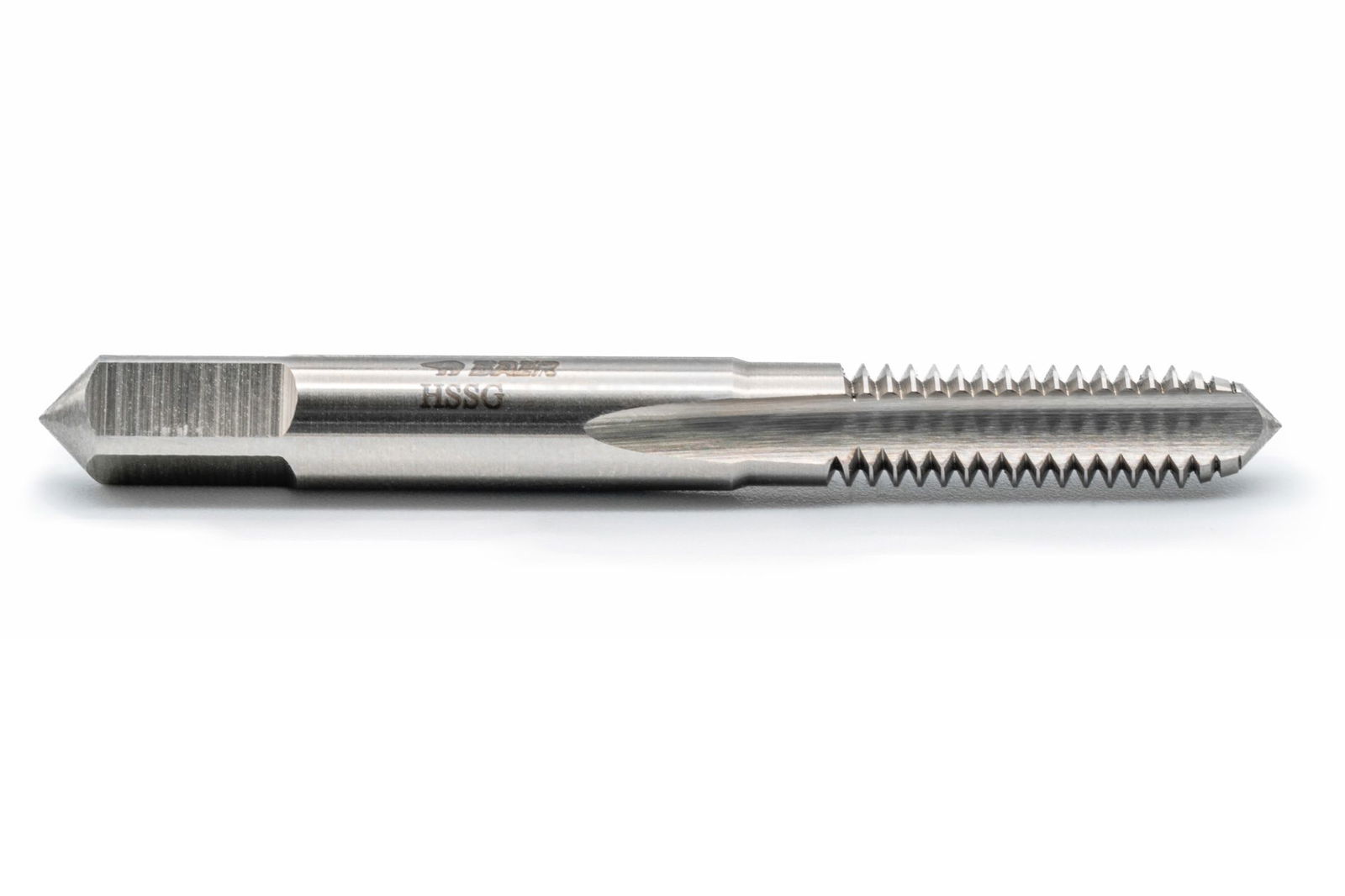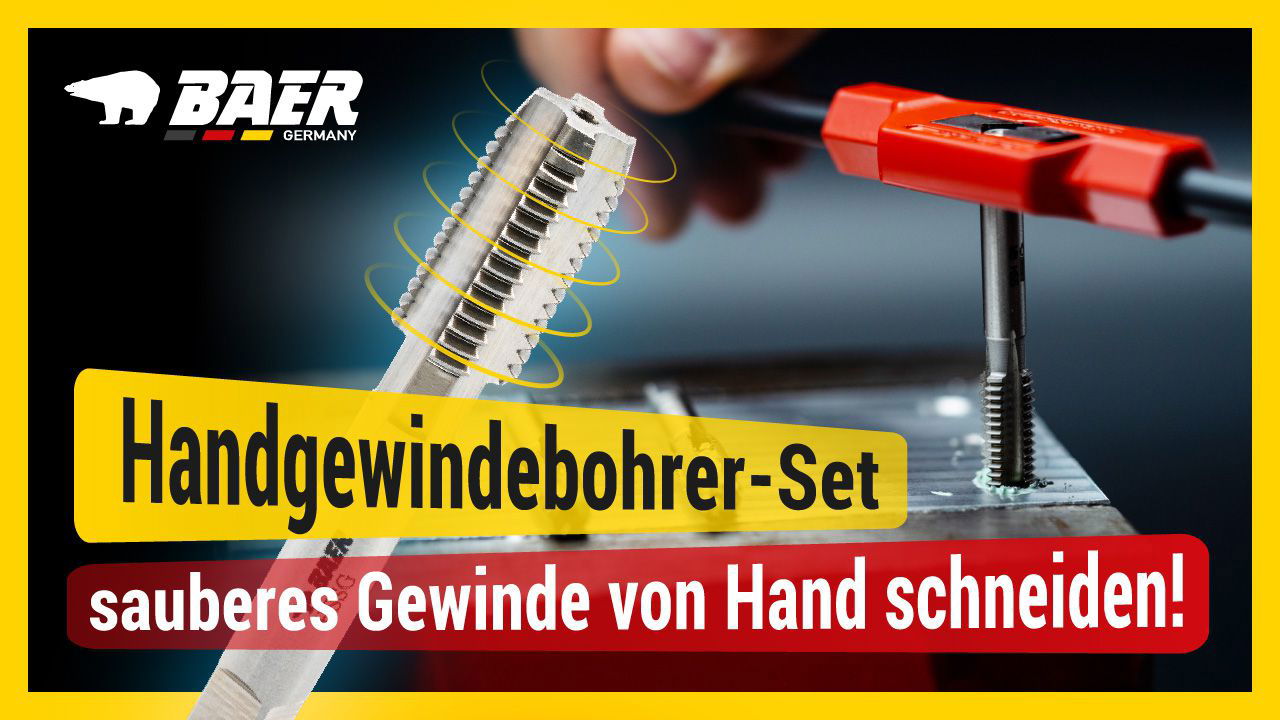BAER HSSG Hand Tap Finishing (No. 3) UNC No. 3 x 48
In stock
BAER HSSG Hand Tap Finishing (No. 3) UNC No. 3 x 48
The hand tap finishing tap (No. 3) enables you to cut a finished thread. It is advantageous to shape the thread beforehand with a taper tap (No. 1) or intermediate tap (No. 2) in order to better distribute the cutting power.
The finishing tap (No. 3) can optionally also be used without a pre- or intermediate tap (No. 2) as it already cuts a fully usable thread. However, the short chamfer makes it more difficult to get straight into the hole and the tool life time is reduced compared to using multi-part hand tap sets
Compared to the machine tap, the hand tap has a short shank. This allows you to cut internal thread by hand without jamming and can be operated with tap wrenches, tool ratchets or other holding tools with square drive.
The thread can be cut into a pre-drilled core hole. Due to the short chamfer of the finish tap, it can be used universally for through holes and blind holes.
Dimensions
| Diameter |
No. 3 |
|---|---|
| Nominal diameter in inches |
0,099 |
| Nominal diameter in mm |
2,515 |
| Pitch |
48 |
| Pitch in mm |
0,529 |
| Dimension |
UNC No. 3 x 48 |
| Square |
2,1 mm |
Characteristics
| Product group |
Screw taps |
|---|---|
| Product type |
Hand tap sets |
| Thread standard |
UNC: American Unified National Coarse thread according to ANSI B1.1 |
| Tolerance |
2B |
| Direction |
Right |
| Standard |
DIN 352 |
| Tensile strength at room temperature |
up to 900 N/mm² | 27.1 HRC |
| Material |
HSSG bright |
Technical information – Screw taps

2.1 mm

Through hole and blind hole up to 2 x D

Form C straight fluted

2-3 threads

Rarely occurs. Chips remain in flutes.

External cooling and lubrication

HSSG bright

up to 900 N/mm² | 27.1 HRC

2B
Applications
- Materials with good machinability up to 900 N/mm²
- Unalloyed and low-alloy steels
Technical drawing

| D1 |
UNC Nr. 3 x 48 |
|---|---|
| D2 |
2,8 mm |
| L1 |
36 mm |
| L2 |
11 mm |
| Diameter |
No. 3 |
| Square |
2,1 mm |
Application – Sample materials for taps
| Unalloyed construction steels | |
|---|---|
| 1.0035 | S185 (St33) |
| 1.0036 | S235JRH |
| 1.0038 | RSt37-2 |
| 1.0039 | S235JRG1+CR |
| 1.0044 | St44-2 |
| 1.0060 | E335 (St60-2) |
| 1.0116 | St37-3 |
| 1.0570 | St 52-3 |
| Alloyed construction steels | |
|---|---|
| 1.5415 | 15Mo3 |
| 1.5423 | 16Mo5 |
| 1.5622 | 14Ni6 |
| 1.7335 | 13CrMo44 |
| 1.7337 | 16CrMo44 |
| 1.7715 | 14MoV63 |
| Free-cutting steels | |
|---|---|
| 1.0711 | 9S20 |
| 1.0715 | 9SMn28 |
| 1.0718 | 11SMnPb30 |
| 1.0721 | 10S20 |
| 1.0723 | 15S20 |
| 1.0726 | 35S20 |
| 1.0737 | 9SMnPb36 |
| 1.0758 | 60SPb20 |
| Case-hardening steels | |
|---|---|
| 1.0401 | (C15) |
| 1.7016 | 17CR3 |
| 1.7131 | 16MnCr5 |
| 1.5919 | 15CrNi6 |
| Quenched and tempered steels unalloyed | |
|---|---|
| 1.0402 | C 22 |
| 1.1151 | C22E (Ck22) |
| 1.0503 | C 45 |
| 1.1191 | C45E (Ck45) |
| Cast steel | |
|---|---|
| 1.0420 | GS-38 |
| 1.5419 | GS-22 Mo 4 |
| 1.6750 | GS-20 NiCrMo3 7 |
| 1.7357 | GS-17 CrMo 5 5 |
| Malleable cast iron | |
|---|---|
| 0.8145 | EN-GJMB 450-6 |
| 0.8170 | EN-GJMB 700-2 |
| 0.8045 | EN-GJMW-450-7 |
| 0.8055 | EN-GJMW-550-4 |
| Pure copper low-alloyed | |
|---|---|
| 2.0240 | CuZn15 |
| 2.0265 | CuZn30 |
| Brass short-chipping | |
|---|---|
| 2.0401 | CuZn39Pb3 |
| Brass long-chipping | |
|---|---|
| 2.0321 | CuZn37 |
| 2.0335 | CuZn36 |
| 2.0360 | CuZn40 |
| Aluminum cast Si > 5-12 % | |
|---|---|
| 3.2161 | G-AlSi8Cu3 |
| 3.2163 | G-AlSi9Cu3 |
| 3.2381 | G-AlSi10Mg |
| 3.2583 | G-AlSi12(Cu) |
| Lamellar graphite cast iron | |
|---|---|
| 0.6010 | EN-GJL 100 (GG-10) |
| 0.6020 | EN-GJL 200 (GG -20) |
| 0.6025 | EN-GJL 250 (GG-25) |
| 0.6030 | EN-GJL 300 (GG -30) |
| Copper-tin alloy (bronze) short-chipping | |
|---|---|
| 2.1090.01 | G-CuSn7ZnPb |
| 2.1086.01 | G-CuSn10Zn |
| 2.1097 | G-CuSn5ZnPb |
| Pure copper, low-alloyed copper | |
|---|---|
| 2.0240 | CuZn15 |
| 2.0265 | CuZn30 |
Further information
- UNC - Unified National Coarse Thread Series ANSI B1.1 American coarse thread
- Designations, geometries and definitions on taps
- Thread tolerances of the internal thread
- Internal thread and core hole dimensions
- Tap Chamfer forms
- Comparison inch-mm
- Surface treatments on tapping tools
- Cutting speeds and lubrication/cooling
- Information about tapping
- Material table
Safety instructions
Login





